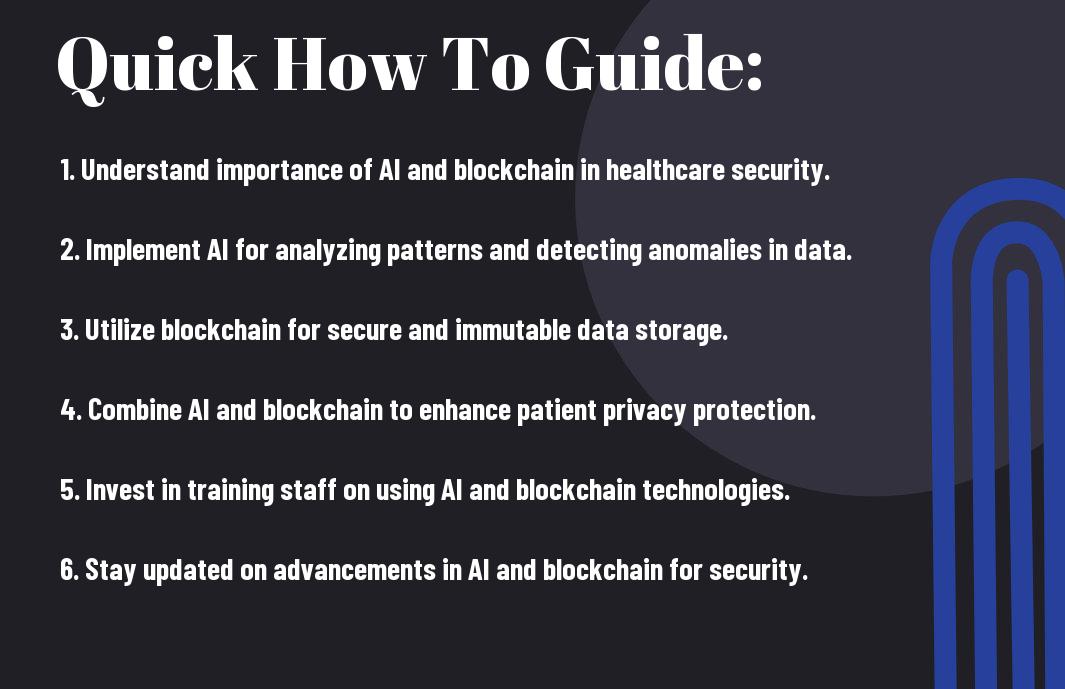Are AI And Blockchain The Future Of Healthcare Security This is an vital guide for anyone concerned about healthcare security. In this post, I will discuss the role of AI and blockchain in securing sensitive healthcare data and the potential benefits they bring. By leveraging these technologies, you can ensure that your personal information is secure from malicious actors and unauthorized access. Stay tuned to learn more about the future of healthcare security!
Table of Contents

How to Ensure Data Integrity in Healthcare with AI and Blockchain
Tips for Implementing AI-powered Data Encryption

Before stepping into the world of AI-powered data encryption, it’s crucial to understand the key tips for implementing this technology in healthcare. Firstly, ensure that the encryption algorithms used are secure and comply with industry standards. Secondly, regularly update and patch encryption software to safeguard against emerging threats. Lastly, train your staff on encryption best practices to prevent human error in handling sensitive data. Thou, always conduct regular audits to assess the effectiveness of your encryption methods.
- AI-powered data encryption
- Secure encryption algorithms
- Regular updates and patching
- Staff training
- Regular audits
Factors to Consider for Secure Data Storage

Encryption is just one piece of the puzzle when it comes to securing healthcare data. When storing sensitive information, factors like access control, data segregation, and backup procedures play a crucial role in maintaining data integrity. Knowing how to effectively implement these measures will fortify your overall data security strategy. Thou, it’s vital to regularly review and update your storage mechanisms to adapt to evolving security threats.
- Access control
- Data segregation
- Backup procedures
- Regular review and updates
It’s not just about encrypting your data; it’s also about how you store it. Ensuring access control mechanisms limit who can view and modify sensitive information adds an extra layer of protection. Data segregation involves categorizing data based on sensitivity levels and storing it accordingly, reducing the risk of unauthorized access. Regularly backing up data ensures that even if a breach occurs, you can restore your important information. Knowing the ins and outs of these storage considerations is imperative for maintaining a secure healthcare data environment.
How to Protect Patient Data from Cyber Threats using AI-driven Solutions
How to Identify Potential Security Risks with AI-powered Analytics
For safeguarding patient data, AI-powered analytics can help in identifying potential security risks by continuously monitoring system logs, user behaviors, and network traffic. By analyzing patterns and anomalies, AI can detect any unusual activities that may indicate a breach or cyber threat, allowing you to take proactive measures to secure your healthcare systems.
Tips for Developing a Robust Incident Response Plan
Developing a robust incident response plan is crucial for effectively managing and mitigating cyber threats in healthcare. Ensure your plan includes steps for immediate response, containment, eradication, and recovery. Conduct regular drills and simulations to test the efficiency of your plan and update it regularly to address emerging threats. Any delays in responding to a cyber incident can have severe consequences for patient data security.
- Continuous monitoring: Utilize AI to continuously monitor system logs and user behaviors.
- Regular drills: Conduct regular drills and simulations to test the efficiency of your incident response plan.
- Update plan: Regularly update your incident response plan to address emerging cyber threats.
The Role of Blockchain in Healthcare Security: A Guide
How to Leverage Blockchain for Secure Health Records Management
Keep your health records safe and secure by leveraging blockchain technology. By storing your medical data in a decentralized and encrypted ledger, you can ensure that only authorized individuals have access to your sensitive information. This extra layer of security provided by blockchain helps in preventing data breaches and unauthorized tampering.
Factors to Consider for Implementing Blockchain-based Systems
To successfully implement blockchain-based systems in healthcare, consider factors such as scalability, interoperability, regulatory compliance, and data privacy. Ensure that the blockchain network can handle the volume of health records while being able to communicate with existing healthcare systems. Additionally, compliance with regulations like GDPR and HIPAA is crucial to protect patient data. After addressing these factors, you can effectively enhance security and trust in healthcare data management.
Final Words
On the whole, I believe that AI and blockchain technologies have the potential to revolutionize healthcare security by offering enhanced data protection and privacy. By leveraging these innovative tools, you can ensure that your sensitive medical information is kept secure and tamper-proof, ultimately leading to a more trustworthy and efficient healthcare system.
Q: What is the role of AI in healthcare security?
A: AI plays a crucial role in healthcare security by helping to detect and prevent security breaches, analyze vast amounts of data for anomalies, and improve overall system efficiency and effectiveness.
Q: How does blockchain technology enhance healthcare security?
A: Blockchain technology enhances healthcare security by providing a decentralized and immutable ledger that securely stores patient data, ensures data integrity, and allows for secure data sharing among healthcare providers.
Q: What are the potential benefits of integrating AI and blockchain in healthcare security?
A: The integration of AI and blockchain in healthcare security can lead to improved data privacy, enhanced cybersecurity measures, streamlined processes, better regulatory compliance, and ultimately, increased trust and confidence in the healthcare system.
